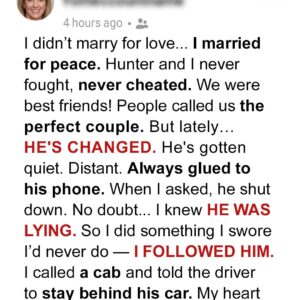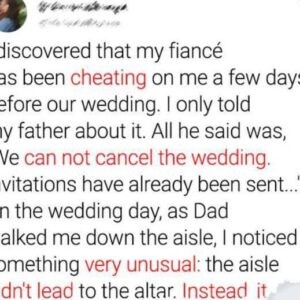My name is Beatrice, though everyone close to me calls me Bea. At eighty-two, I thought my heart had seen it all. But what happened at my grandson’s wedding proved that life still had a few lessons left—ones that cut deep, then healed stronger than before.
I live alone now, in the little house my husband Henry built with his own two hands back in 1963. I can still picture him in the summer evenings—shirt drenched in sweat, eyes sparkling with pride. He’s been gone nearly twenty years, and our son Arthur passed a decade after him. The silence of this house can be heavy sometimes, but my grandson Liam fills it with light whenever he visits. He’s all I have left—and for me, that’s enough.
After Arthur’s funeral, his widow remarried and moved to Florida. Liam was sixteen at the time—tall, quiet, caught between boyhood and manhood. She asked if he could stay with me through high school. I said yes before she could finish the question. Those years were the happiest I’d had since Henry died. I made him breakfast every morning, packed his lunches with little notes, and stayed up late listening to him talk about dreams that felt bigger than either of us. He worked hard, went to college, became an architect, and never once lost his kindness.
So when he called last spring, voice trembling with joy, I knew something important was coming.
“Nana,” he said, “I’ve met someone. I think she’s the one.”
I smiled through tears. “Tell me about her, dear.”
“Her name’s Cassandra. She’s smart, beautiful… her family owns half the businesses in town. But she’s different, Nana. She’s warm.”
I wanted to believe him.
I met Cassandra at a brunch her mother hosted. Their house looked like something from a movie—white columns, marble floors, chandeliers that could’ve lit a ballroom. I wore my best green dress and pinned on the pearl brooch Henry gave me for our fifteenth anniversary. But the moment I stepped inside, I felt out of place.
Cassandra’s mother smiled politely. “How lovely of you to come,” she said, in a tone that made it sound like she was humoring a stranger who’d wandered in off the street.
Then Cassandra appeared—elegant, poised, and perfect. “Hi, Nana Bea,” she said, giving me a quick side hug. Her eyes flicked to my shoes. “Oh, those are so retro, aren’t they?”
“Yes,” I began softly. “Henry bought them for—”
“How charming!” she interrupted, already turning to wave at someone else.
The rest of the brunch felt like trying to breathe through glass. When I shared a story about Liam building a treehouse as a boy, her friends laughed as if I’d told a joke. I smiled through it, as women of my generation do, but inside, I felt the first tiny crack.
The wedding came three months later, grander than anything I’d ever seen. Four hundred guests, a live orchestra, flowers so tall they brushed the chandeliers. Cassandra’s family ran everything—the venue, the guest list, the menu. I felt like a visitor at my own grandson’s wedding.
I couldn’t afford a luxurious gift. My pension barely covers my bills. So instead, I made something with love—the one thing I still had in abundance.
For weeks, I worked on a quilt. I used pieces of fabric that carried our family’s story: a square from Liam’s baby blanket, a patch from his first school uniform, a bit of Henry’s favorite flannel shirt that still smelled faintly of him if I held it close. Even a piece of my own wedding dress. In the corner, I stitched their names—“Liam & Cassandra, joined by love”—and added a small heart made from lace off my old veil.
When my fingers ached, I whispered to Henry, “Help me make it perfect for him.”
At the reception, they seated me at the back with the distant relatives no one remembered. The noise, the music, the lights—it was all too much. Then came the moment that would change everything: the gift presentation.
A videographer filmed as the couple opened one extravagant present after another—silverware, fine china, envelopes full of money. The guests clapped, cheered, toasted. Then Cassandra picked up mine.
“This one’s from Nana Bea!” she announced brightly. The room applauded politely.
She pulled out the quilt and held it high. For a second, there was silence. Then she laughed—a sharp, high-pitched sound that turned my stomach.
“Oh my gosh, you made this?” she said, giggling. Her bridesmaids leaned in, snickering. One whispered, “It looks like something from a thrift store.”
Cassandra smirked. “Maybe we’ll keep it in the basement with the holiday stuff.”
The laughter that followed felt endless. My chest tightened. My hands shook. I forced a smile, my voice trembling. “It’s all right, dear. It’s just something from the heart.”
She had already moved on to the next gift.
I stood quietly, smoothed my dress, and walked out. Outside under the fairy lights, I took a deep breath. My heart felt too old for that kind of pain.
Then I felt a hand grip mine.
It was Liam. His eyes were wet, jaw tight. “Nana, don’t leave.”
“Sweetheart, it’s okay,” I whispered. “She’s just nervous—”
“No.” He shook his head. “It’s not okay.”
He pulled me gently back into the hall, the crowd falling silent as he grabbed the microphone. Cassandra froze.
“This wedding,” Liam said, voice trembling but strong, “is over.”
A gasp rippled through the room.
Cassandra’s face went pale. “What are you doing?”
He looked at her with eyes I’d never seen before—hurt, clear, certain. “You mocked the only person who’s ever truly loved me. The woman who raised me. Who gave me everything when she had nothing. And you humiliated her in front of everyone.”
Her father stood, red with rage. “Young man, you need to calm down!”
Liam didn’t even glance at him. “You can keep your money and your guests. But I’m not marrying someone who thinks love looks like this.”
Cassandra’s voice cracked. “You’re ruining everything!”
He smiled sadly. “You already did.”
He turned to me. “Come on, Nana. Let’s go home.”
No one stopped us. Not a soul moved. As we stepped out into the night, I felt the air shift—cool, clean, full of something like freedom.
We drove in silence. When we reached my house, he carried the quilt inside like it was made of gold. He laid it gently on my couch and ran a hand over the stitches.
“You put our whole story in this,” he said quietly. “She just couldn’t see it.”
I touched his cheek. “You did the right thing, my boy.”
The next morning, the story was everywhere. Someone had filmed it all. “Groom Ends Lavish Wedding After Bride Mocks Grandmother’s Handmade Gift.” The video went viral. Millions watched. Strangers sent letters, calling Liam the grandson everyone wished for. Cassandra’s family tried to erase the footage, but it was too late. Their businesses suffered, their reputation shattered.
As for us, life went on. Liam stayed with me for a while, and we planted herbs in the garden, watched old movies, and found peace in small things.
A year later, he met someone new—Lila. She wasn’t from a wealthy family, but her heart was pure gold. The first time I met her, she knelt beside my chair and said, “It’s an honor to meet you, Mrs. Bea.” I knew then she was the one.
Two years later, I received a photo that made me cry for hours. Lila sat in a rocking chair, holding their newborn daughter—wrapped in that same quilt. I’d unstitched Cassandra’s name and replaced it with hers.
Liam’s message read: “You were right, Nana. Love stitched with care never unravels.”
I looked at the picture and smiled through my tears. Henry used to say dignity never fades, and he was right. Money can buy chandeliers and castles—but it can’t buy love, kindness, or the warmth of a hand that holds yours through every storm.
And that quilt—mocked, scorned, and laughed at—now wraps the next generation in love.
Cassandra will never understand that. But I do.

